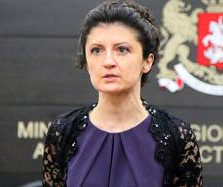
TBILISI, DFWatch–The Georgian government plans to change the procedure for appointing a chief prosecutor. Instead of letting the prime minister do the selection, parliament will have the power to do this.
According to Justice Minister Thea Tsulukiani, this will be a ‘great reform’. But lawyers we interviewed think such a step is not enough to be called a reform and fear it won’t lead to any fruitful results.
The Prosecutor General’s Office, which is the major investigative body, was criticized during Saakashvili and continues to be criticized today. Questions are being raised about whether it is controlled by the government, especially when it comes to the cases against former officials.
The groups that are now in government were critical of the way the Prosecutor General’s Office was functioning during Saakashvili’s presidency, but after coming into power they did not change a thing, even though one of of their election promises was to reform the body.
Under Georgian legislation, the chief prosecutor, who chairs this body, is appointed or dismissed by the prime minister, which is why it is often considered that chief prosecutor can be a conductor of the ruling force or prime minister.
Thursday, the justice minister said in parliament that the government plans to solve this issue by introducing a bill which hands power to appoint a chief prosecutor over to the parliament.
“There will be council of prosecutor, where the Prosecutor General’s Office will also be involved, but what is important is that civil society is included when electing a chief prosecutor and that the process of selecting candidates and in the end parliament will elect him. I hope it will happen this year,” she said.
Since the initiative is still fresh, no-one has seen the draft so far and the government’s opponents, as well as lawyers, find it difficult to answer DF Watch and try to evaluate this step by the government.
Lawyer Levan Alapishvili says that generally speaking it is positive that the chief prosecutor is elected by parliament. However, a single step cannot be considered a reform.
“So the problems in this system nowadays cannot be solved this way,” he tells us.
“This is not only about the chief prosecutor. There is the office too, which requires essential changes. On the other hand, the Prosecutor General’s Office is not the only body authorized to conduct investigations, and how will this issue be solved in other bodies?”
He thinks all the law enforcement bodies need reform.
“We learned today that a draft bill was prepared and no-one has been involved in this process. Another thing is that one specific issue is wrapped like they are conducting a whole reform. This is just an attempt to mislead people. It would be better to start thinking about real reform.”

